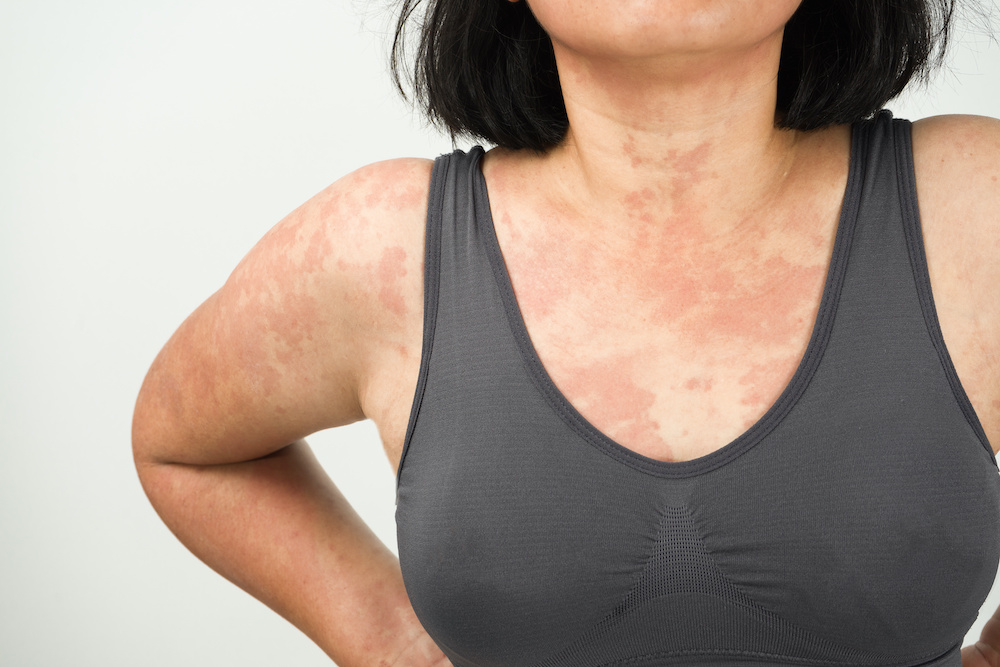Hives 101: What You Need to Know

If you suffer from frequent bouts of hives, you know that they can be uncomfortable and embarrassing. The appearance of these red welts on your skin can bring unwanted attention from others who wonder if they are contagious. Hives, also called urticaria, are a common condition that can be brought on by a number of triggers. While they typically disappear on their own, more serious cases of hives can persist for weeks or even months.
At Buckhead Dermatology in Atlanta and College Park, we have helped patients understand the underlying cause of their hives and get started on an effective treatment plan to clear their skin. When you have an outbreak of hives in the Atlanta area, consult with a board-certified dermatologist right away to get the treatment you need.
What are hives?
Urticaria (hives) are raised, red or pink welts that can appear anywhere on the skin. They can develop as individual bumps or in a group. Hives can range in size significantly, from that of the tip of a cotton swab to the size of a plate. Although they most frequently itch, hives can also burn or sting.
Those who suffer from hives might never know when they will occur, as they often come on suddenly due to an allergic reaction to some unknown trigger. For most people, hives fade on their own in a day. In more acute cases, they can persist for up to 6 weeks.
What causes hives?
In many cases, hives are caused by an allergic reaction to some kind of trigger. Common triggers include foods such as dairy products, nuts, eggs and shellfish. Pet dander, insect bites and pollen are other frequent causes of hives. Medications and chemical irritants have also been known to cause hives to develop.
Some people develop hives from other causes, most commonly:
- Bacterial infections
- Fungal infections
- Over exposure to the sun or heat
- Over exposure to cold
- Intense physical exertion
- Stress
- Itching
How does a dermatologist diagnose hives?
If you suspect that you have hives, you should consult with a board-certified dermatologist in your area. In most cases, an experienced dermatologist will be able to diagnose hives from looking at the welts on your skin. Once diagnosed, your doctor will perform a physical and gather your health history to try to identify possible causes. An allergy test or blood draw may be requested based on the results of the physical exam and health history. In some cases, your doctor may perform a biopsy to further examine affected skin under a microscope.
What are the possible treatments for hives?
The first step in a treatment plan is to identify the cause of the hives. If a definite cause is known, treatment may be as simple as eliminating the trigger from your day-to-day life. For example, if the hives appear to be caused by a reaction to shellfish, your doctor will advise you to avoid shellfish to see if the hives subside.
A course of antihistamines can be used to reduce itching and rash. When your body has an allergic reaction to some substance, your body will produce a chemical called a histamine. Histamines cause the symptoms that we commonly associate with allergies such as watery eyes and a stuffy nose. Antihistamines work to counteract the effects of the histamines and reduce the symptoms.
Other possible treatments can include:
- Corticosteroids
- Antibiotics
- Anti-inflammatory medications
- Adrenaline shots for serious cases
For most people, hives are an uncomfortable annoyance that can be remedied by avoiding triggering substances. Other people suffer from chronic hives, or hives lasting more than six weeks. It is important to communicate to your dermatologist how long you have been experiencing hives and whether they come and go or persist.
Buckhead Dermatology Atlanta and College Park
If you believe you have a case of the hives and live in the Atlanta area, schedule an appointment with Dr. Straughn of Buckhead Dermatology today. Although not usually life threatening, severe cases of hives can be an indication of a serious allergic reaction or infection that could be lethal. Your doctor can diagnose your symptoms and suggest the best treatment plan for you.
Contact Buckhead Dermatology today at 404-816-4000 to schedule an appointment at our Atlanta or College Park dermatology offices.
